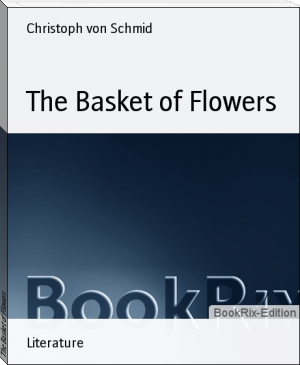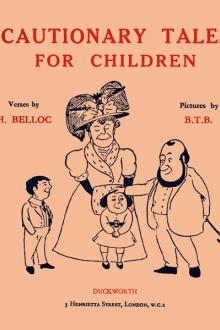The Basket of Flowers, Christoph von Schmid [red white royal blue txt] 📗

- Author: Christoph von Schmid
- Performer: -
Book online «The Basket of Flowers, Christoph von Schmid [red white royal blue txt] 📗». Author Christoph von Schmid

The Project Gutenberg EBook of The Basket of Flowers, by Christoph von Schmid
This eBook is for the use of anyone anywhere at no cost and with
almost no restrictions whatsoever. You may copy it, give it away or
re-use it under the terms of the Project Gutenberg License included
with this eBook or online at www.gutenberg.org
Title: The Basket of Flowers
Author: Christoph von Schmid
Illustrator: Watson Charlton
W. E. Evans
Release Date: January 4, 2008 [EBook #24160]
Language: English
*** START OF THIS PROJECT GUTENBERG EBOOK THE BASKET OF FLOWERS ***
Produced by David Clarke and the Online Distributed
Proofreading Team at http://www.pgdp.net
Transcriber's Note: The Frontispiece illustration is not available.
THE BASKET OF FLOWERSBy WATSON CHARLTON and W. E. EVANS.
JOHN F. SHAW & CO., LTD.,
3, Pilgrim Street, London.
PUBLISHER'S NOTE
In putting forward a new edition of The Basket of Flowers no apology is needed. This charming story is now something of a children's classic, and the only merits that the publisher can claim for the present edition are variety in the manner of the illustration and the outward design of the book. To these may be added, perhaps, the further claim that in the present English version, which is copyright, some of the more glaring faults that mar the original translation are avoided. For the rest, it is hoped that the charm of the original has been maintained.
CONTENTS
CHAP. Page I. THE GARDENER'S DAUGHTER 1 II. THE BASKET OF FLOWERS 12 III. THE MISSING RING 21 IV. MARY IN PRISON 30 V. THE TRIAL 36 VI. A PAINFUL MEETING 42 VII. SENTENCED 49 VIII. FINDING NEW FRIENDS 58 IX. A NEW HOME 65 X. A FATHER'S LAST WORDS 72 XI. MARY'S GREAT LOSS 82 XII. CHANGES AT PINE FARM 90 XIII. AGAIN A WANDERER 97 XIV. A STRANGE MEETING 104 XV. THE YOUNG COUNTESS'S STORY 108 XVI. HOW THE RING WAS FOUND 115 XVII. REPARATION 123 XVIII. PINE FARM REVISITED 127 XIX. RETRIBUTION 134 XX. FORGIVING AN ENEMY 140 XXI. CONCLUSION 145LIST OF ILLUSTRATIONS
AN OFFICER CAME TO MARY'S CELL Frontispiece Facing p. MARY SHYLY OFFERED HER PRESENT 16 "OH, MY FATHER, BE SURE THAT I HAVE NOT THE RING" 32 SHE RAISED HERSELF HASTILY, FORGETTING HER CHAINS 48 SHE THREW THE BASKET AT MARY'S FEET 64 LOOKING UP SHE SAW THE BEAUTIFUL FACE AND FIGURE OF A WOMAN 96 MARY WAS AFFECTED TO THE HEART WHEN SHE HEARD JULIETTE'S STORY 144
CHAPTER I.
THE GARDENER'S DAUGHTER.
The simple story which is told in this little book treats of things which happened a long time ago in a foreign country, where the manners and customs are widely different from our own. It is necessary to explain this at the beginning, because the reader will meet with incidents in the narrative which would otherwise seem strange and inconsistent. Two lessons which the story teaches, however, may be learned in all countries. The first is that the human heart has from the beginning been full of sin, producing, for the most part, evil fruit, which results in misery; and in the second place, that there is only one remedy for this state of the soul, the remedy of God's Holy Spirit, which, wherever it enters, produces the fruits of righteousness and perfect peace. It is because we believe that the study of these opposing principles as exhibited in the experience of others may be profitable to young readers, that the story of the Basket of Flowers is now presented.
James Rode, who, with his daughter Mary, forms the subject of our tale, lived over one hundred years ago in the village of Eichbourg, in Germany. When he was very young his parents sent him to be trained as a gardener in the beautiful grounds of the Count of Eichbourg. James was a bright, intelligent lad, fond of work, and of an amiable disposition, and he soon made himself a favourite with the people among whom he associated. His happy genial disposition and his readiness to oblige endeared him to all with whom he came in contact. The secret of James' character lay deeper than mere disposition. He had early given his heart to the Lord Jesus Christ, and the amiable qualities which he now displayed were the fruits of the Holy Spirit which had been implanted in him. But it was not only among his companions that James was well liked. He was a favourite with the Count's children, and so modest and unassuming was his behaviour that he was sometimes allowed to be in the Castle with them, and to share in the lessons which they got.
Being of an intelligent turn of mind, James profited by all the advantages which his position gave him, and, after his engagement was completed, the Count offered him a well-paid position in his large household at Vienna. It was a temptation for James, who had the ambition common to young men, and, but for one thing, he would have gladly accepted his master's offer. The Count was a kind man, but he was not a Christian, and God was not honoured in his household. James knew that if he took the place in his house, he might be asked to do things which as a Christian he believed to be wrong; and so he decided to refuse the offer, tempting as it was, and to remain in the humble position in which he had been born. The Count was not offended with James for his decision; and to show his respect for him he gave him an easy lease of a little property, consisting of a cottage, a well-stocked orchard, and a kitchen garden.
By and by James married a young woman, whose principles, like his own, were deeply religious, and together they lived in comfort and harmony many years. Then children came to brighten their life, but one after another was taken away, and at last only Mary remained, whose history this story is mainly occupied in telling.
When James Rode was a little over sixty years of age his wife died. Mary was now five years old, and a fine, beautiful girl. The neighbours were foolish enough sometimes to call her pretty to her face, and, although this was a dangerous thing to do, it had not the effect of spoiling her. Besides being beautiful in face, Mary had a beautiful character, and was modest and obedient, and possessed unbounded love for her father. When she came to be fifteen years of age, she became her father's housekeeper, and so thorough and constant were her habits of cleanliness that the kitchen utensils shone brightly enough to be easily mistaken for new.
We have already informed our readers that her father, James Rode, earned his living as a gardener. Twice a week he carried the vegetables and fruit which he cultivated to the nearest market-town. But, while the growing of fruits and vegetables had to be looked after in order to secure his subsistence, his greatest delight was in the cultivation of flowers; and in this pleasant task Mary assisted him every hour which she could spare from the work of the house. She counted the hours devoted to this task among the happiest of her life, for her father had the art of turning labour into pleasure by his interesting and entertaining conversation. To Mary, who had grown up, as it were, in the midst of plants, there had come a natural taste for flowers, and the garden was to her a little world. She was never at a loss for a delightful occupation, for every hour which she had at her disposal was spent in cultivating the young plants with the utmost care.
Specially did she find pleasure in studying the buds of every strange species. Her young imagination delighted in picturing what kind of flowers they would become; and so impatient was she to see her expectations fulfilled, that she was hardly able to wait until the flowers had unfolded. When the flower for which she had waited long appeared in all its beauty, the sight filled her with a strange joy. In truth, there was not a day which did not bring some new pleasure to Mary's heart. Sometimes it was by a stranger passing the garden and stopping to admire the beauty of the flowers. The children of the neighbourhood, as they passed on their way to school, never failed to peep through the hedge, and were generally rewarded by Mary with some little present of flowers as a token of her goodwill.
James, as a wise father, knew how to direct the taste of his daughter towards the most noble ends. Often he used to say, "Let others spend their money for jewels and silks and other adornments; I will spend mine for flower-seeds. Silks and satins and jewels cannot procure for our children so pure a pleasure as these beautiful exhibitions of the wisdom and benevolence of God."
In the beauty of the various flowers which adorned their garden, in the charming variety of their shapes, in the perfection of their proportions, in the glory of their colours, and in the sweetness of their perfumes, he taught Mary to see and admire the power and wisdom and goodness of God. It was his custom to begin each day with God by spending the first hours of the morning in prayer; and, in order to accomplish this without neglecting his work, it was his habit to rise early. In the beautiful days of spring and summer, James would lead Mary to an arbour in the garden, and, while the birds sang their joyous songs, and the dew sparkled on the grass and flowers, he delighted to talk with his daughter of God, whose bounty sent the sun and the dew, and brought forth the beauty and life of the world. It was here that he first instilled into Mary's mind the idea of God as the tender Father of mankind, whose love was manifested not only in all the beautiful works of nature, which were round them, but above all in the gift of Jesus Christ. It was in this arbour that James had the happiness of seeing Mary's heart gradually unfold to the reception of the truth.
Once in the early part of March, when with shining eyes and bounding feet she brought him the first violet, he said, "Let this beautiful flower serve to you as an emblem of humility and sweetness, by its modest colour, its disposition to flourish in hidden places, and the delicate perfume which it sends forth. May you, my dear child, be like the violet, modest in your demeanour, careless of gaudy clothing, and seeking to do good without making any fuss about it."
At the time when the lilies and roses were in full bloom and when the garden was resplendent with beautiful flowers, the old man, seeing his daughter filled with joy, pointed to a lily unfolding in the rays of the morning sun. "See, in this lily, my daughter, the symbol of innocence. Its leaves are finer than richest satin, and its whiteness equals that of the driven snow. Happy is the daughter whose heart also is pure, for remember the words, 'The pure in heart shall see God.' The more pure the colour,





Comments (0)